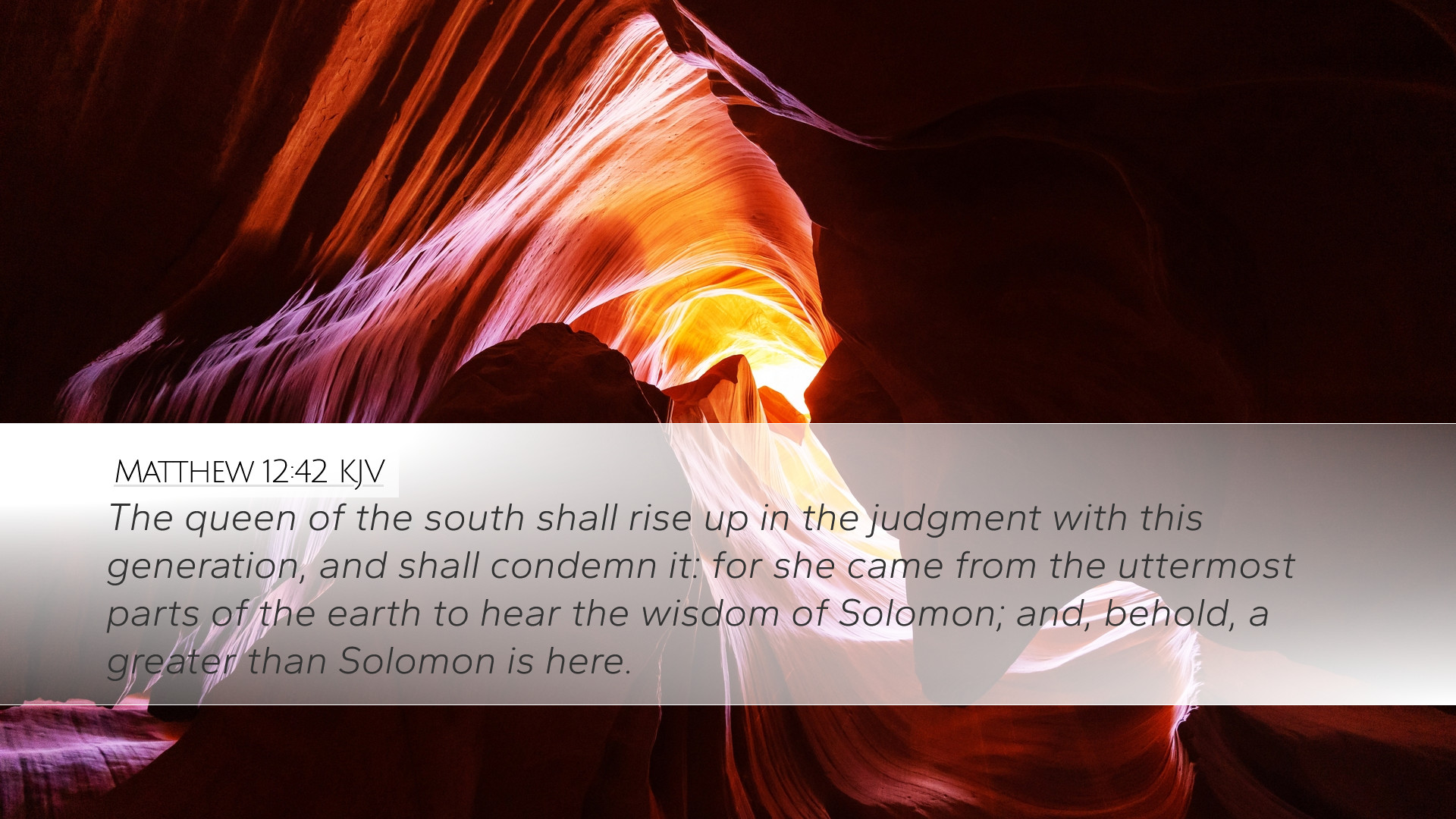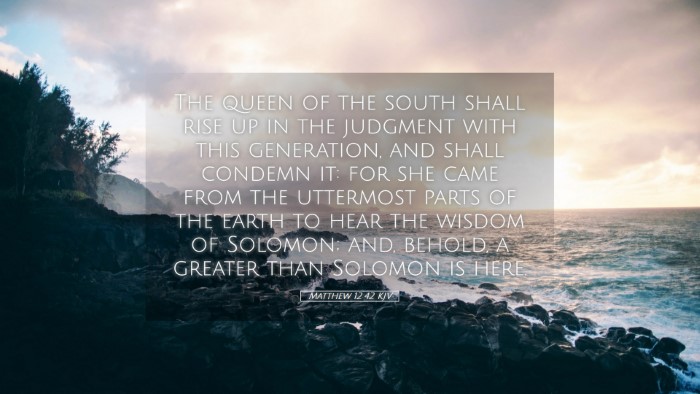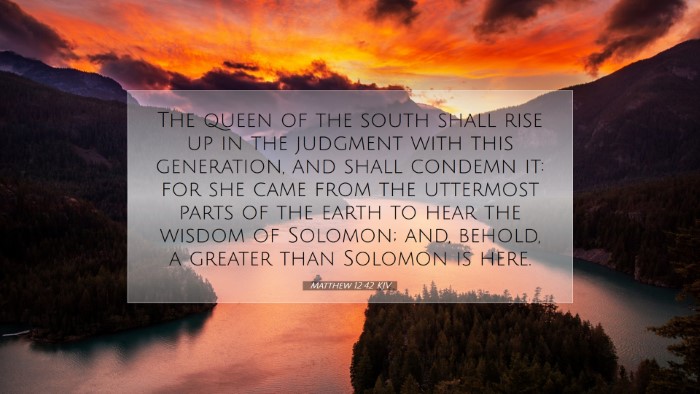Commentary on Matthew 12:42
Verse: "The queen of the south shall rise up in the judgment with this generation, and shall condemn it: for she came from the uttermost parts of the earth to hear the wisdom of Solomon; and, behold, a greater than Solomon is here."
Introduction
In Matthew 12:42, Jesus addresses the unbelief of the people of His time by contrasting their rejection of Him with the faith of the Queen of Sheba, who traveled great distances to hear the wisdom of Solomon. This verse serves as a profound reminder of the importance of recognizing and responding to divine wisdom wherever it is found.
Contextual Background
Matthew 12 is pivotal as it showcases the growing opposition Jesus faced from the religious leaders. The chapter highlights His authority and the misunderstandings surrounding His mission. The mention of the Queen of Sheba serves to illustrate not only the wisdom represented by Solomon but also to emphasize the greater authority and truth that Jesus embodies.
Historical Significance
The Queen of Sheba's journey, as documented in 1 Kings 10:1-13, captures her deep desire for wisdom and understanding. Her recognition of Solomon's wisdom, obtained through God, showed a significant spiritual hunger that often stands in stark contrast to the indifference Jesus encountered.
Theological Implications
This verse lightens several theological insights important in both Old and New Testament analysis. It reveals:
- The Recognition of Authority: The Queen of Sheba's willingness to travel indicates a recognition of the divine wisdom imparted to Solomon. Christ positions Himself as the fulfillment of this wisdom.
- Condemnation of Unbelief: The rebuke of the current generation emphasizes that failure to recognize Christ’s authority yields condemnation. The Queen, a Gentile, demonstrated greater faith than the chosen people.
- The Nature of Divine Wisdom: True wisdom seeks beyond mere human accomplishments and recognizes a higher source.
Exegesis of Key Phrases
The Queen of the South: This title refers to the Queen of Sheba, who was acknowledged for her pursuit of wisdom. Her stature highlights the universal reach of God's truth.
Shall rise up in the judgment: This phrase suggests a future judgment where the actions of the generation are compared with those of faithful seekers from the past.
For she came from the uttermost parts of the earth: Her journey symbolizes the lengths to which individuals will go in search of truth and wisdom, contrasting sharply with the indifference of the contemporaries of Jesus.
A greater than Solomon is here: This proclamation asserts the supremacy of Christ's wisdom over Solomon’s, highlighting His divine nature and authority as the Word made flesh.
Comparative Analysis with Commentaries
Matthew Henry
Henry emphasizes the faith of the Queen of Sheba as worthy of reflection, showcasing how she esteemed the wisdom of the world, while the contemporary generation dismisses the wisdom of God manifested in Christ. His insights remind readers that faith requires action, as demonstrated by her travels.
Albert Barnes
Barnes provides context by elucidating the Queen's journey and her motivations. He points out that her pursuit of wisdom exemplifies the heart of a believer willing to seek God earnestly. Barnes warns of the consequences of indifference and encourages readers to pursue wisdom actively rather than passively awaiting revelation.
Adam Clarke
Clarke examines the cultural and geographic backgrounds of the text, noting the significance of the Queen of Sheba as a Gentile who recognized God’s wisdom through Solomon. Clarke’s analysis draws attention to the inclusivity of God’s wisdom and the rebuke of those blind to it in Jesus' time, ensuring a broader application to believers today.
Practical Application
For pastors and theologians, Matthew 12:42 bears significant weight in preaching and teaching. It calls for introspection within the church, challenging congregations to assess their pursuit of wisdom and their recognition of Christ’s authority. The passage encourages:
- Active Seeking: Just as the Queen sought Solomon, believers should diligently seek divine wisdom through Christ.
- Cultivating Spiritual Hunger: Acknowledge the spiritual void of indifference and foster a culture of pursuit for deeper understanding.
- Recognizing Authority: Teach congregations the importance of acknowledging Jesus’ greater wisdom and authority over their lives.
Conclusion
Matthew 12:42 serves as a timeless reminder of the challenge to seek wisdom beyond worldly understanding and to recognize the supreme authority of Christ. This verse encourages introspection on individual and collective responses to God's revelation, urging a vibrant faith that actively seeks divine truth.


